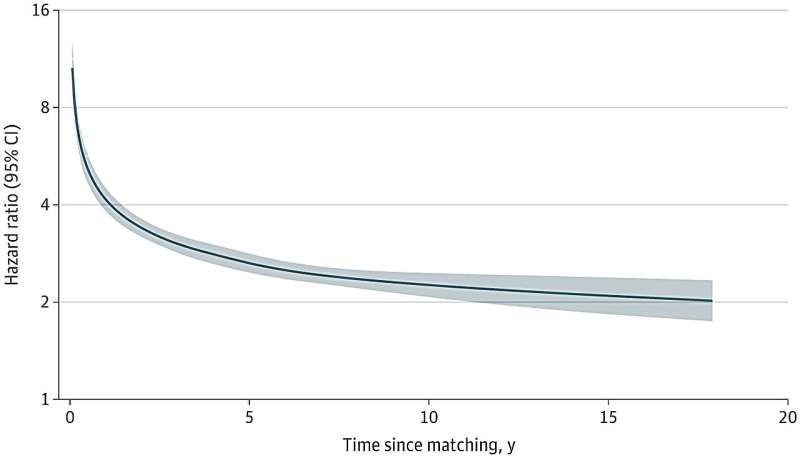This article has been reviewed according to Science X's editorial process and policies. Editors have highlighted the following attributes while ensuring the content's credibility:
fact-checked
peer-reviewed publication
trusted source
proofread
Mothers diagnosed with perinatal depression found to have three times higher risk of suicidal behavior

Maternal suicide is an alarming public health issue and the second most common cause of death during the postnatal period. New research from the Institute of Environmental Medicine (IMM) published in JAMA Network Open shows that mothers with clinically diagnosed perinatal depression had a three times higher risk of suicidal behavior compared to mothers without perinatal depression.
Of maternal deaths, 13%–36% are attributable to suicide, and the consequences are devastating to the newborn and the family. Maternal suicide is linked to a complex interplay of risk factors, including history of psychiatric disorders, socioeconomic disparities, and inadequate access to health care service. It is of paramount importance to identify high-risk populations for preventing maternal suicide and suicidal attempt.
"Our findings suggest that women with clinically diagnosed PND are at an increased risk of suicidal behavior, particularly within one year after PND yet throughout 18 years of follow-up. This highlights the pressing need for vigilant clinically monitoring and prompt intervention for this vulnerable population to prevent such devastating outcomes, regardless of pre-pregnancy history of psychiatric disorders," says Hang Yu, Ph.D. student.
In this nationwide, population-matched cohort study with a maximal follow-up of 18 years, 86,551 women with PND from 2001 to 2017 and 865,510 unaffected women individually matched on age and calendar year at delivery. Sibling comparison was employed to account for familial confounding.
The researchers found that women with a clinical diagnosis of PND had an elevated risk of suicidal behavior compared to population-matched women or their full sisters without PND. Attenuated yet still substantially elevated risks were observed when compared with full sisters without PND who shared partial genetic and familial environmental factors with affected women.
Importantly, such excess risk was apparent among women regardless of their history of psychiatric disorders, suggesting that PND is linked to an added risk of suicidal behavior beyond that of the risk associated with psychiatric disorders occurring before the perinatal period. Moreover, the risk elevations were particularly high shortly after the PND diagnosis, and despite the rapid decline over time, remained throughout 18 years of follow-up.
More information: Hang Yu et al, Perinatal Depression and Risk of Suicidal Behavior, JAMA Network Open (2024). DOI: 10.1001/jamanetworkopen.2023.50897



















